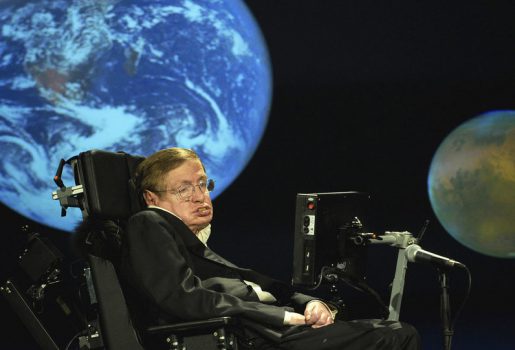Un membre du cercle, Claire Dupont, nous propose de découvrir ce dialogue entre le chef d’orchestre David Amos et Steven Hawking à propos de la musique classique et de Wagner :
Question: You’ve been called the most brilliant mind of our time. Whom do you consider the most brilliant people of our time, and why?
He answered, “I can’t think of anyone at the present time I would call particularly brilliant. But maybe looking back later on, we will be able to see who the great minds of this age were”.
This immediately brought to mind what I have been preaching for a long time: Many people have told me and sincerely believe that there are no great composers today, and that the classical masterpieces we all cherish were composed 100 or more years in the past. I have argued to the contrary; we have living composers among us with the musical talent and genius of past masters such as Bach, Beethoven, Brahms, and so many others, and it is our duty to listen to newer music, separate the ordinary and mediocre from the great, nurture it, promote it, perform and record it, and make it available for future generations.
To insinuate that there is no worthwhile music being composed today which will be the masterpieces for future generations to enjoy, is a complete fallacy. As in all disciplines, it is sometimes difficult to see talent when it is looking at us straight in the eye. It takes a wide understanding of the subject at hand, an open mind, a good historical perspective, and most difficult of all, imagination.
We could be talking about architecture, sculpture, ballet, opera, symphony, chamber music, science, medicine, business, economy, or even political concepts. But, believe me, talent and quality are everywhere, and today, probably more than in other times. All we need is to break the veil of preconceptions we may have. Optimism is essential, but, I repeat, imagination and vision are the key elements that many well meaning people with the power to change history, unfortunately, do not have.
Hawking was also asked, What is your typical Sunday morning like? And he answered, “Very lazy. I listen to classical music and read the newspaper”.
Bingo! I have always insisted, many times in classes, in radio, in lectures, and in this column, that classical music is not only music of dead composers to be heard and enjoyed by the old and affluent. Classical music is for everyone, and it does wonders in clearing the mind, setting healthy, logical perspectives, and providing quality peace of mind. And, oh, yes, it is beautiful to listen to and it generates positive emotions. But, unless we are exposed to classical music at home and early in life, the introduction to classical music’s great rewards are more difficult to embrace.
One should, and can not escape the importance and power of quality, in every aspect of our lives.
And finally, Hawking was asked, as a continuation to the last question: Do you have a favorite classical composer? To which he answered, “I was drawn to Wagner—whose name is nearly impossible for my speech synthesizer to pronounce— when I was first diagnosed with ALS. His music expressed my mood at the time. Wagner manages to convey emotion with music better than anyone, before or since”.
My response: Well, nobody is perfect! But, there is a lot to be said about when in certain powerfully emotional phases of our lives, we are exposed to music which penetrates our souls in just the right way, the music becomes a very personal part of us forever. Search your past, and you may find strong musical memories, popular or classical, which carried you through rough patches.
The virulent anti-Semitism of Wagner prevents me from embracing him and his music with no reservations, but his genius is beyond any logical argument. But, there are so many other composers, living, recently living, and the revered past masters, who have given us a priceless treasury of music that make our lives far more meaningful.
(Extrait de http://www.sdjewishworld.com/2010/09/28/on-stephen-hawking-genius-and-music/)
